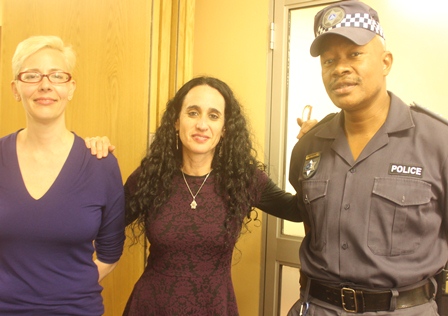Illegal drug markets are not a police problem. Community engagement will be far more effective in the war against whoonga than general drug policing.
This was according to Dr Laura Huey from the University of Western Ontario, Canada, during her talk regarding the ‘war against whoonga’ which is also affecting the City of Durban. Dr Huey was delivering her talk at a recent DUT Urban Futures Centre seminar.
The Associate Professor of Sociology’s research focuses on policing, cyber-security and surveillance. She has authored two books on the provision of security for homeless crime victims and is co-editor (with Luis Fernandez) of a collection on alternate forms of policing.
“Drugs are not a police problem. They have been made into a police problem. Drugs are a social problem with social causes and social consequences that the police have been made responsible for and often they are inadequate tools and support,” said Dr Huey.
She said in order to fight the war against whoonga, the community had to understand the unique features of the local drug markets and players. Other tools that could be used are understanding crime hotspots, understanding where prolific offenders are, and building intelligence gathering through communities that are typically shut from the process.
“Policing does not stop people from taking drugs and it does not solve the drug problem. Drug markets and the crime that they generate can never be completely eradicated but they can be managed and their negative effect can be significantly reduced.”
Captain Dingaan Motsamai from the Durban Metro Police spoke about the challenges police will face in implementing Dr Huey’s strategy. “Crime prevention is gazetted and it’s centralised into the government and its passed to the rest of the people. At police level, the station commander cannot go against the crime prevention methodology and it has to be infiltrated from the central government to the people,” said Capt Motsamai.
Thandeka Sihlali, a third-year Architecture student, said, “It makes sense when police work with the community to fight drugs. I like the idea of involving family members of drug addicts because they are the ones who know them better.”
Prof Monique Marks who heads the UFC at DUT said the discussion gave universities, NGOs and other organisations who are keen to engage about this serious a way forward. She warned that if the City’s whoonga problem was not dealt with “smartly”, it will increase in size.
As a result of this keen interest, DUT and the University of Western Ontario will build a research partnership to dig more into the dynamics of Durban’s drug markets. “The first step of this would be a partnership grant that we will apply for in November 2014 that will solidify everything and we will start bringing people here. We will start preliminary research in April 2015,” said Dr Huey.
The aim of the research is to improve the understanding of how Durban drug markets operate and its social causes and effects. The research will entail talking to a lot of people, including drug addicts, drug experts, low level dealers, families and local communities. The project will support the police by finding out what they require in terms of helping facilitate intelligence gathering.
– Gift Nyamapfene
Pictured: Dr Laura Huey, Prof Monique Marks and Captain Dingaan Motsamai.


